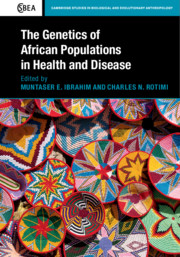Book contents
- The Genetics of African Populations in Health and Disease
- Cambridge Studies in Biological and Evolutionary Anthropology
- The Genetics of African Populations in Health and Disease
- Copyright page
- Contents
- Contributors
- 1 Reflections on Conceptualizing Africa for Biological Studies with a Historical Component
- 2 History and Genetics in Africa
- 3 Disease, Selection, and Evolution in the African Landscape
- 4 Genetic Susceptibility to Visceral Leishmaniasis
- 5 Genetics of Infection in Sub-Saharan Africa
- 6 Pharmacogenomics and Infectious Diseases in Africa
- 7 A Glimpse into Pharmacogenomics in Africa
- 8 Genomics of Cardiometabolic Disorders in Sub-Saharan Africa
- 9 Breast Cancer in African Populations
- 10 Sociobiological Transition and Cancer
- 11 The Genetic Epidemiology of Orphan Diseases in North Africa
- 12 Birth Defects and Genetic Disease in Sub-Saharan Africa
- 13 Neurogenetic Disorders in Africa: Hereditary Spastic Paraplegia
- 14 Enabling Genomic Revolution in Africa
- Index
- References
14 - Enabling Genomic Revolution in Africa
History and Impact of the African Society of Human Genetics and the Human Heredity and Health in Africa Initiative
Published online by Cambridge University Press: 02 December 2019
- The Genetics of African Populations in Health and Disease
- Cambridge Studies in Biological and Evolutionary Anthropology
- The Genetics of African Populations in Health and Disease
- Copyright page
- Contents
- Contributors
- 1 Reflections on Conceptualizing Africa for Biological Studies with a Historical Component
- 2 History and Genetics in Africa
- 3 Disease, Selection, and Evolution in the African Landscape
- 4 Genetic Susceptibility to Visceral Leishmaniasis
- 5 Genetics of Infection in Sub-Saharan Africa
- 6 Pharmacogenomics and Infectious Diseases in Africa
- 7 A Glimpse into Pharmacogenomics in Africa
- 8 Genomics of Cardiometabolic Disorders in Sub-Saharan Africa
- 9 Breast Cancer in African Populations
- 10 Sociobiological Transition and Cancer
- 11 The Genetic Epidemiology of Orphan Diseases in North Africa
- 12 Birth Defects and Genetic Disease in Sub-Saharan Africa
- 13 Neurogenetic Disorders in Africa: Hereditary Spastic Paraplegia
- 14 Enabling Genomic Revolution in Africa
- Index
- References
Summary
The African Society of Human Genetics (AfSHG) was established in 2003 after considerable consultation with African and international scientists interested in human genetics, genomics, and biomedical research on the African continent. Following these deliberations, including a satellite meeting held during the 2001 American Society of Human Genetics (ASHG) annual meeting in San Diego, California, it became clear that no other society, organization, or conference specifically addresses the critical needs for African researchers and institutions interested in genomics research and capacity development to enable full participation of African scientists and students in the ongoing global genomic revolution. The AfSHG was subsequently established with the aim of equipping the African scientific community and policy-makers with the information and practical knowledge they need to contribute to the field of genomics research and to attract global attention to the efforts of African scientists. It was decided that membership in the AfSHG will be open to any individual who is interested in issues of human genetics in Africa, including but not limited to issues of education, clinical care, research, public health, ethics, law, and policy. The AfSHG membership agreed that a major objective of the society will be to provide a forum for scientists interested in the broad enterprise of human genetics in Africa to meet, interact, network, and collaborate. The society has achieved, and continues to achieve, this objective through a series of annual workshops and meetings held in different African countries. To date, annual meetings have been held in Accra, Ghana (2003 and 2013), Washington, DC, USA (2004), Johannesburg, South Africa (2005), Addis Abba, Ethiopia (2006), Cairo, Egypt (2007 and 2017), Yaoundé, Cameroon (2009), Cape Town, South Africa (2011), Senegal (2016), and Kigali, Rwanda (2018); this year’s meeting is planned to take place in Bamako, Mali (2019). The objectives of the society are also advanced through direct mailing to members of the society, specialized workshops, website,1 and by its membership in and affiliation with international genetic organizations, including the International Federation of Human Genetics, the Human Variome Project Consortium, Human Genome Organization (HUGO), the Southern African Society of Human Genetics, and the ASHG. Consistent with its mission to enhance human genetics across the African continent, the AfSHG has facilitated the establishment of six national societies of human genetics in Mali, Cameroon, Senegal, the Democratic Republic of the Congo, Rwanda, and Egypt. A complete list of member societies is available on the website.
- Type
- Chapter
- Information
- The Genetics of African Populations in Health and Disease , pp. 320 - 330Publisher: Cambridge University PressPrint publication year: 2019



